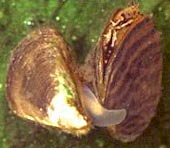![]()

Home Page
and index of current stories
Older stories on
Resources News
Links to general resource,
environmental sites
Links to non-profit
environmental/resource groups
Links to environmental/resource news
sources
E-mail Resources
News
Low Tech Best Approach to Stopping with Zebra Mussels?
Zeba mussels, a European species that is believed to have immigrated to North America in the bilge water of ships, are big trouble when they reach freshwater lakes. They can choke water pumps drawing water from the lake, foul outboard motors, and generally make an area a less pleasant place for both residents and tourists.
Public education has been the biggest weapon in controlling them, encouraging people to thoroughly clean hulls, drain bilge water and take other precautions when moving boats from lakes with zebra mussels to those that have not yet been infected. Once the mussels infest a lake, there's no chemical or other known way to eradicate them without doing major damage to the lake- unless you consider doing it by hand.
That's basically what's been happening on Lake George in New York State. The number of zebra mussels found in Lake George has declined dramatically since last year, when Rensselaer Polytechnic Institute researchers and volunteers began manually pulling the troublesome mollusks from the water.
The time-consuming, labor-intensive effort appears to be paying off. In the spring of last year, shortly after the first adult zebra mussels were discovered in the popular recreational lake, divers collected more than 19,000 of them. Last fall's harvest netted 1,800. Since April of this year, however, divers have pulled only 352 mussels.
"Of course, I can't guarantee that all of the zebra mussels are gone from Lake George," said Sandra Nierzwicki-Bauer, professor of biology at Rensselaer and director of its Darrin Fresh Water Institute. "That would be premature. But I am optimistic, based on the numbers, that we got most of them at this site."
More good news is the size of the mussels pulled this year: All were too large to have been born in 2000 or 2001. Last year's harvest seems to have culled the mussels before they reproduced, and they have not been found elsewhere in the lake.
Zebra mussel's were first found in Lake George in 1995 but never matured before last year, probably because the quality of the water was unsuitable for their reproduction. The area of the lake where they were located, and removed from, was at an inlet that probably brought water more suitable for the mussels into the lake.
Using divers to collect the mussels would not be practical in larger lakes where the number of mussels is in the millions rather than tens of thousands. It may, however, prove to be a technique worth considering to stop or slow the spread of zebra mussels into smaller lakes as they slowly spread westward.